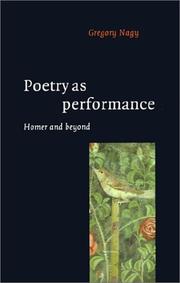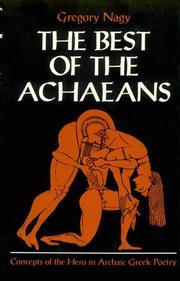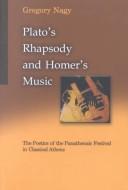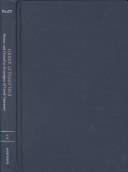| Listing 1 - 10 of 109 | << page >> |
Sort by
|
Book
ISBN: 9780674073401 0674073401 Year: 2013 Publisher: Cambridge: Belknap press of Harvard university press,
Abstract | Keywords | Export | Availability | Bookmark
 Loading...
Loading...Choose an application
- Reference Manager
- EndNote
- RefWorks (Direct export to RefWorks)
Book
ISBN: 0674152751 Year: 1974 Volume: 33 Publisher: Cambridge (Mass.) : Harvard university press,
Abstract | Keywords | Export | Availability | Bookmark
 Loading...
Loading...Choose an application
- Reference Manager
- EndNote
- RefWorks (Direct export to RefWorks)
Greek language --- Indic languages --- Grec (Langue) --- Metrics and rhythmics --- Versification --- Métrique et rythmique --- Metrics and rhythmics. --- Métrique et rythmique
Book
ISBN: 0674362268 9780674362260 Year: 1970 Publisher: Cambridge (Mass.): Harvard university press,
Abstract | Keywords | Export | Availability | Bookmark
 Loading...
Loading...Choose an application
- Reference Manager
- EndNote
- RefWorks (Direct export to RefWorks)
Indo-European languages --- Greek language --- Langues indo-européennes --- Grec (Langue) --- Phonetics --- Dialects --- Phonétique --- Dialectes --- -Indo-European languages --- -Aryan languages --- Indo-Germanic languages --- Classical languages --- Classical philology --- Greek philology --- Dialects. --- Phonetics. --- -Dialects --- Langues indo-européennes --- Phonétique --- Aryan languages --- Indo-European languages - Phonetics --- Greek language - Dialects

ISBN: 0521551358 0521558484 9780521558488 Year: 1996 Publisher: Cambridge : Cambridge university press,
Abstract | Keywords | Export | Availability | Bookmark
 Loading...
Loading...Choose an application
- Reference Manager
- EndNote
- RefWorks (Direct export to RefWorks)
Epic poetry, Greek --- Performing arts --- Oral tradition --- Transmission of texts. --- Poésie épique grecque --- Arts du spectacle --- Tradition orale --- Transmission de textes --- History and criticism --- Theory, etc. --- Criticism, Textual. --- History. --- Histoire et critique --- Théorie, etc --- Critique textuelle --- Histoire --- Homer --- Oral interpretation of poetry --- Oral-formulaic analysis. --- History --- Poésie épique grecque --- Théorie, etc --- Oral-formulaic analysis --- Transmission of texts --- Literary transmission --- Manuscript transmission --- Textual transmission --- Criticism, Textual --- Editions --- Manuscripts --- Show business --- Arts --- Performance art --- Tradition, Oral --- Oral communication --- Folklore --- Oral history --- Poetry --- Poetry reading --- Reading poetry aloud --- Formulaic analysis, Oral --- Folk literature --- Greek epic poetry --- Epic poetry, Classical --- Greek poetry --- History and criticism&delete& --- Theory, etc --- Oral interpretation --- Methodology --- Homeros --- Homère --- Technique. --- Homerus --- Hóiméar --- Hūmīrūs --- Gomer --- Omir --- Omer --- Omero --- Ho-ma --- Homa --- Homérosz --- האמער --- הומירוס --- הומר --- הומרוס --- هومر --- هوميروس --- 荷马 --- Ὅμηρος --- Гамэр --- Hamėr --- Омир --- Homero --- 호메로스 --- Homerosŭ --- Homērs --- Homeras --- Хомер --- ホメーロス --- ホメロス --- Гомер --- Homeri --- Hema --- Pseudo-Homer --- Pseudo Omero --- Homer. --- Epic poetry, Greek Criticism, Textual --- Epic poetry, Greek - History and criticism - Theory, etc. --- Epic poetry, Greek - Criticism, Textual. --- Oral interpretation of poetry - History - To 1500. --- Performing arts - Greece - History - To 1500. --- Oral tradition - Greece - History - To 1500.

ISBN: 0801823889 9780801823886 Year: 1986 Publisher: Baltimore (Md.): Johns Hopkins University press,
Abstract | Keywords | Export | Availability | Bookmark
 Loading...
Loading...Choose an application
- Reference Manager
- EndNote
- RefWorks (Direct export to RefWorks)
Book
ISBN: 0801419859 9780801419850 0801480485 1501732021 Year: 1990 Publisher: Ithaca (N.Y.): Cornell university press,
Abstract | Keywords | Export | Availability | Bookmark
 Loading...
Loading...Choose an application
- Reference Manager
- EndNote
- RefWorks (Direct export to RefWorks)
Mythology in literature --- Mythology, Greek, in literature --- Greek poetry --- Poétique --- --Mythologie grecque --- --History and criticism --- -Mythology in literature --- Greek literature --- History and criticism --- Greek poetry - History and criticism --- Mythologie grecque

ISBN: 0292705530 0292705549 0292796366 9780292705531 9780292705548 Year: 2003 Publisher: Austin: University of Texas press,
Abstract | Keywords | Export | Availability | Bookmark
 Loading...
Loading...Choose an application
- Reference Manager
- EndNote
- RefWorks (Direct export to RefWorks)
"More than any other classicist, Nagy tries to uncover and explain the brilliance that can come from an oral tradition. . . . This is an important contribution to the field of Homeric poetics, more narrowly, and to the study of Greek literature more broadly." --Carol Dougherty, Professor of Classical Studies, Wellesley College The Homeric Iliad and Odyssey are among the world's foremost epics. Yet, millennia after their composition, basic questions remain about them. Who was Homer--a real or an ideal poet? When were the poems composed--at a single point in time, or over centuries of composition and performance? And how were the poems committed to writing? These uncertainties have been known as The Homeric Question, and many scholars, including Gregory Nagy, have sought to solve it. In Homeric Responses, Nagy presents a series of essays that further elaborate his theories regarding the oral composition and evolution of the Homeric epics. Building on his previous work in Homeric Questions and Poetry as Performance: Homer and Beyond and responding to some of his critics, he examines such issues as the importance of performance and the interaction between audience and poet in shaping the poetry the role of the rhapsode (the performer of the poems) in the composition and transmission of the poetry the "irreversible mistakes" and cross-references in the Iliad and Odyssey as evidences of artistic creativity and the Iliadic description of the shield of Achilles as a pointer to the world outside the poem, the polis of the audience.
Epic poetry, Greek --- Oral tradition --- Oral-formulaic analysis --- History and criticism --- Theory, etc. --- Homer --- Technique --- Oral-formulaic analysis. --- Technique. --- Formulaic analysis, Oral --- Folk literature --- Folklore --- Greek epic poetry --- Epic poetry, Classical --- Greek poetry --- History and criticism&delete& --- Theory, etc --- Methodology --- Homeros --- Homère --- Homerus --- Hóiméar --- Hūmīrūs --- Gomer --- Omir --- Omer --- Omero --- Ho-ma --- Homa --- Homérosz --- האמער --- הומירוס --- הומר --- הומרוס --- هومر --- هوميروس --- 荷马 --- Ὅμηρος --- Гамэр --- Hamėr --- Омир --- Homero --- 호메로스 --- Homerosŭ --- Homērs --- Homeras --- Хомер --- ホメーロス --- ホメロス --- Гомер --- Homeri --- Hema --- Pseudo-Homer --- Pseudo Omero --- Epic poetry, Greek - History and criticism - Theory, etc. --- Oral tradition - Greece --- Homer - Technique

ISBN: 0674009630 9780674009639 Year: 2002 Publisher: Cambridge (Mass.) : Harvard university press,
Abstract | Keywords | Export | Availability | Bookmark
 Loading...
Loading...Choose an application
- Reference Manager
- EndNote
- RefWorks (Direct export to RefWorks)
Epic poetry, Greek --- Athena (Greek deity) --- Performing arts --- Oral tradition --- Oral-formulaic analysis --- Transmission of texts --- Aesthetics, Ancient --- Panathenaia --- Poetics --- History and criticism --- Cult --- Homer --- Plato --- Literary style --- Aesthetics --- Athens (Greece) --- Civilization --- Epic poetry, Greek - History and criticism --- Athena (Greek deity) - Cult - Greece - Athens --- Performing arts - Greece - Athens --- Oral tradition - Greece --- Homer - Literary style --- Plato - Aesthetics --- Homer - Aesthetics --- Athens (Greece) - Civilization

ISBN: 0415937701 1306344646 1136065946 0203616898 1136065865 9781136065941 Year: 2002 Publisher: London : Routledge,
Abstract | Keywords | Export | Availability | Bookmark
 Loading...
Loading...Choose an application
- Reference Manager
- EndNote
- RefWorks (Direct export to RefWorks)
First published in 2002. Routledge is an imprint of Taylor & Francis, an informa company.
Greek literature --- History and criticism. --- Balkan literature --- Byzantine literature --- Classical literature --- Classical philology --- Greek philology
Book
ISBN: 9780520256927 9780520294875 9780520950245 0520950240 0520256921 1280102160 9781280102165 9786613520555 6613520551 0520294874 Year: 2010 Volume: 67 Publisher: Berkeley : University of California Press,
Abstract | Keywords | Export | Availability | Bookmark
 Loading...
Loading...Choose an application
- Reference Manager
- EndNote
- RefWorks (Direct export to RefWorks)
Homer the Preclassic considers the development of the Homeric poems-in particular the Iliad and Odyssey-during the time when they were still part of the oral tradition. Gregory Nagy traces the evolution of rival "Homers" and the different versions of Homeric poetry in this pretextual period, reconstructed over a time frame extending back from the sixth century BCE to the Bronze Age. Accurate in their linguistic detail and surprising in their implications, Nagy's insights conjure the Greeks' nostalgia for the imagined "epic space" of Troy and for the resonances and distortions this mythic past provided to the various Greek constituencies for whom the Homeric poems were so central and definitive.
Epic poetry, Greek --- Oral tradition --- History and criticism --- History --- Homer --- Criticism and interpretation --- Tradition, Oral --- Oral communication --- Folklore --- Oral history --- Homeros --- Homère --- Criticism and interpretation. --- Homerus --- History and criticism. --- Poetry --- History of Greece --- Hóiméar --- Hūmīrūs --- Gomer --- Omir --- Omer --- Omero --- Ho-ma --- Homa --- Homérosz --- האמער --- הומירוס --- הומר --- הומרוס --- هومر --- هوميروس --- 荷马 --- Ὅμηρος --- Гамэр --- Hamėr --- Омир --- Homero --- 호메로스 --- Homerosŭ --- Homērs --- Homeras --- Хомер --- ホメーロス --- ホメロス --- Гомер --- Homeri --- Hema --- Pseudo-Homer --- Pseudo Omero --- Epic poetry, Greek - History and criticism --- Oral tradition - Greece - History - To 1500 --- Homer - Criticism and interpretation --- ancient athens. --- ancient greece. --- ancient greek literature. --- ancient literature. --- ancient rome. --- ancient writers. --- classical literature. --- discussion books. --- epic poems. --- epic. --- epics and sagas. --- greek epics. --- greek orators. --- greek roman thought. --- greek writers. --- high school english class. --- history of greece. --- history of poetry. --- homeric poems. --- homeric poetry. --- homeric studies. --- illiad. --- literary classics. --- literary criticism. --- literature professors. --- odyssey. --- oral tradition. --- poetry. --- sixth century. --- studying literature. --- writers.
| Listing 1 - 10 of 109 | << page >> |
Sort by
|

 Search
Search Feedback
Feedback About UniCat
About UniCat  Help
Help News
News